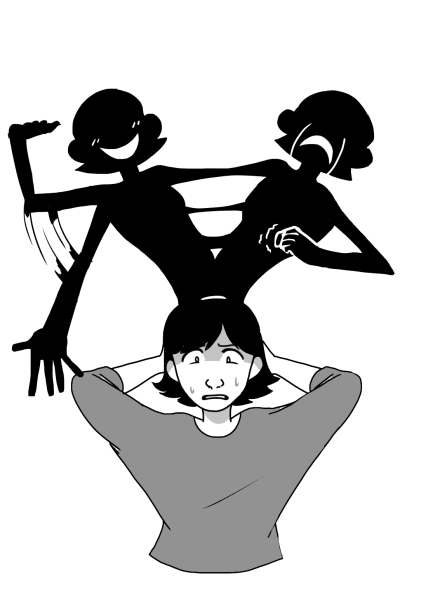
“I just physically cannot pick up pencils. I cannot think. I cannot concentrate and that is hard to do because when you have bipolar depression you cannot control how you feel emotionally,” says Dakota*.
A lack of control is a common feeling amongst those who have bipolar depression, also referred to as bipolar disorder. Stanford psychiatrist Dr. Shashank Joshi explains, “Bipolar disorder is where you are at two different poles. One pole is the depressive pole where you are feeling really down. [The other pole of bipolar disorder is where] your ups are so up and your moods are just really elevated to the point where you can’t function properly.”
Although patients with bipolar depression experience both mania, the state of excessive energy levels, and depression, Gary Sachs, MD, director of the Bipolar Clinic and Research Program at Massachusetts General Hospital in Boston, says, “[Patients] will be depressed more often [than manic].”
Depression

In addition to a depressive state, Dakota experiences manic states. “When that happens, I can literally pull an all nighter, and I will go for a run in the middle of the night. I will be fine during the day. I will feel like I slept through the night,” Dakota says. “The thing about it is that I do not know how long they are going to last. They can last for a week, they can last for two hours. Everything just varies.”
The short bursts of energy are unique to children and teenagers with bipolar disorder. Often times, adults will experience manic states for days at a time. Joshi says, “In child and teen bipolar disorder, you may have symptoms for as short as hours at a time, and you are feeling energetic and great about things, but it can also become accompanied by a lot of ignorant rage.”
While Dakota does not experience a lot of anger as a result of her bipolar depression, she experiences panic attacks. During high school, Dakota got them frequently. “I had panic attacks about anything: ‘I have to go to school, panic attack. I only have five minutes to get ready, panic attack,’” recalls Dakota.
Another contributing factor to Dakota’s panic attacks was her rough relationship with her dad. As the middle child, Dakota felt stuck between her shining star older sister and baby sister. Dakota also noticed that her father was harder on her than her sisters, and she did not understand why. “[His treatment of me] got really bad, and then it got worse in high school. In sophomore year, I chose to cut all types of communication with him. I do not see him; I do not email him; I do not talk to him. It is just healthier for me. I feel a lot better,” says Dakota.
For patients with bipolar disorder, familial support plays an integral role. “The family is often a really big part of the solution. They may also be part of the problem,” Joshi says.
“Sometimes during a bipolar episode, if you have parents that do not understand it, and the child or teen is manic, [the parents] may punish them inappropriately and treat them way too harsh.”
Support System
Dakota is thankful to have her mom as her rock. Since her diagnosis, Dakota’s mom has been by her side. “There are tons of single moms out there, but I honestly think she works so hard. I know it is really tough to deal with a child, like me, with bipolar depression,” continues Dakota. “You want to help your child so much, but you do not know what to do. Throughout this whole thing, she has been amazing, [by] how strong she has stayed. She does not cry in front of me.”
Additionally, Dakota participates in athletics*, which serves as an outlet for her bipolar depression emotionally and physically. Playing a sport, Dakota can exert all her extra energy and take her mind off of things. “It was a really good way for me to make new friends and have a support system. I think that just working out and finding a different way to put out all my emotions is a really good idea,” says Dakota. “I know that if I did not have [it], I would be a mess.”
However, Dakota has not told any of her coaches or teammates about her bipolar disorder. She has only informed a limited amount of friends and says, “I do not mind talking about it, but I do not want to force my friends to feel sorry for me because they should not.”
According to WebMD, over 10 million Americans have bipolar disorder
Having bipolar depression for so long, Dakota has learned how to hide her feelings from her friends, so they do not worry about her. “I would push [my feelings] off. I think I am noticeably sad or upset, but I would not talk to anyone,” explains Dakota. “I would just choose to not involve myself in anything and when I got home, I would just let it out. I would push it off until I was alone, in a private place.”
The friends that Dakota has told are very supportive of her. “I have two very good friends who always ask me ‘Hey, how are you today? Are you better?’ I think that helps a lot because unless you have it, it is hard to understand what it is like,” says Dakota.
Dakota understands that it is challenging for her friends who she constantly leans on for support. “I always say, ‘If you don’t want to listen to me, you do not have to,’ and they always say ‘No, tell us everything. Tell me if you need to call me. Go ahead,’” says Dakota. “I am so grateful for those friends I have and how much support they have given me.”
Acceptance
When she heard her diagnosis for bipolar depression, Dakota recalls being upset. “It was really hard to accept and definitely takes a lot [of time] to start accepting it. For me, it was not hard to be like, ‘Oh, I have it.’ It was harder for me to be like, ‘What do I do from there?’” Dakota continues. “Even getting there, or having a better understanding of it is so much better for me. Once you start accepting it and being like, ‘This is who I am and I am just going to go with it.’”
Dakota feels that there was more that she could have done if she did not have bipolar depression, like getting better grades or saying yes to more opportunities. “My mom always tells me that it is not under my control. It is just a lot of frustration, but it is all about taking the best of the situation, the best outcome out of your situation, and just really appreciating that,” notes Dakota.
Next fall, Dakota is going to college*. At first, Dakota was not sure if she was ready to go to college, but she has friends going there with her and realizes it is not too far from home. Dakota says, “I am not going to have that family support system. If I really do have a problem, I can come back home or if I really do not like college, I can stop and transfer back in. It is a big decision, but in the end, there are always other options and opportunities.”
To all others who have bipolar depression, Dakota advises, “Learn from your environment. What makes you work best? Who makes you the happiest? Choose the environment that suits you best.”
*Name changed for anonymity; specific details generalized to protect the identity of the individual.




